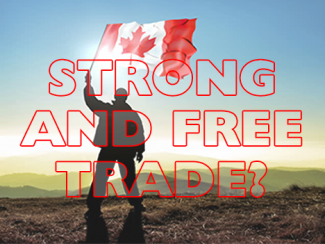TRADING INSULTS
A trade war of words is safe enough; a real trade war won’t be

THE DONALD TRUMP TRAVELLING S**T SHOW HAS FINALLY MADE IT TO CANADA. After leaving the G7 Summit in Quebec the U.S. President called the Canadian Prime Minister “weak and very dishonest”. Then he doubled-down the next day by telling Canadians that we would pay a high price for his perceived snub.
While our initial response was, and probably still is, a collective raised finger, Canada needs to figure out where we are going on trade and trade issues. Fast. But first let’s back it up a little.
Canada is a trading nation. We always have been. We have abundant natural resources that we ship raw or processed to other countries who need them. We import things like coffee that we can’t grow or produce ourselves. Over the years we have developed some systems to regulate this trade and to remove barriers to the flow of goods and services. All good so far, right?
These trading systems have been codified over the years through international regulatory bodies like the World Trade Organization and through individual and group arrangements between countries. All of this has been intended to remove or reduce the tariffs and taxes they charge each other while trading. Still good, right?
Then it got a bit more complicated, at least for Canada, starting with a Free Trade agreement with the United States in the 1980’s that morphed into the North American Free Trade Agreement in 1994.
What the heck is NAFTA?
The North American Free Trade Agreement came into effect in 1994 and while it certainly increased trade in North America, it had dramatic and severe economic and environmental consequences as well.
The size of NAFTA and its impact on our economy is huge: $ 3.5 billion in goods and services flows between Canada, U.S., and Mexico every day; $750 billion between Canada and US alone last year.
On the upside, there was certainly a rapid and steady growth in trade and the price of goods—food, many consumer goods, and services were lowered in Canada and the United States.
The downside, NAFTA meant many Canadian and American unions lost leverage and Mexican workers were exploited. Many farmers and companies have gone out of business. Canada had bled manufacturing jobs and continues to do so. As many as 350,000 manufacturing jobs were lost in Canada in the past 6 years. And NAFTA reduced environmental protection and regulation and Mexico in particular paid a high environmental price as a result of NAFTA.
Though NAFTA was labelled as “free trade,” it left the country vulnerable to exactly what is transpiring today: American protectionist tariffs.
Tariffs and trade tiffs
For about a year the three NAFTA countries have been discussing that trade agreement. The Americans want to re-open it and may even walk away from it.
To solidify their position, they have imposed tariffs or penalties on certain goods and products coming into their country. This includes 10 per cent on aluminium coming from Canada and 25 per cent on steel. In return we put our own Canadian tariffs on a range of goods coming from the United States.
The problem with these actions is that we can’t win a trade war with the Americans. Duncan Cameron, writing in Rabble says that while the actions by Trump et al were insulting, that we might even be doing more damage with retaliatory tariffs. That’s because “Canadian exporters are more dependent on the U.S. market than American exporters are on the Canadian market. Canadian retaliatory tariffs, while annoying, are not going to damage U.S. industry. U.S. tariffs, on the other hand, can cause a lot of trouble to Canada.”
Where do we go from here?
That’s a good question. Duncan Cameron suggests that we would be “better off
working with other countries to build a reasonable multilateral trading world rather than depending on the goodwill of a Donald Trump to re-negotiate NAFTA, or betting that he will not be re-elected.”
He suggests that instead of putting all our eggs, and especially our dairy products into an American basket, that we shop and trade with the world.
We have nothing to lose but our tariffs.
- 30 -












Add new comment